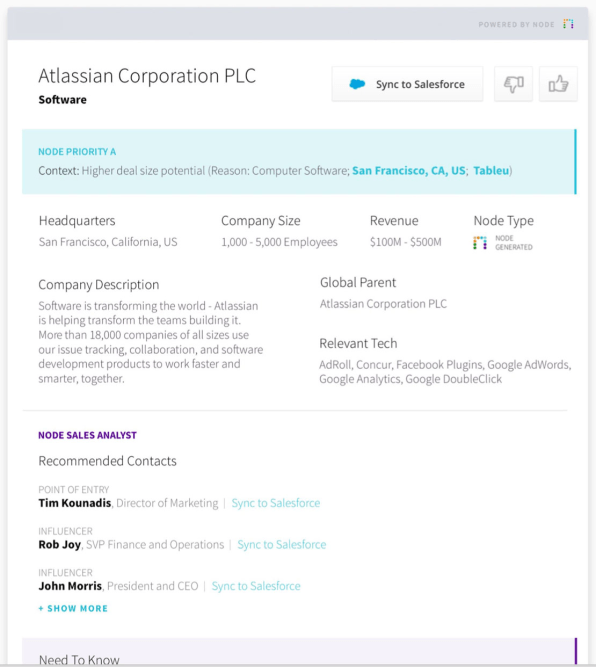This Ex-Googler’s Predictive Search Tool Could Change The Future Of Networking
“Google has had a major influence in terms of my DNA and how I look at the world,” reflects Falon Fatemi, one of Google’s youngest employees when she was hired, at age 19, in 2005. Her experience there–and in the years since leaving her final role as a Googler, at YouTube, in 2011–laid the foundation for her newest venture, a search and discovery tool called Node.
Search is useful when you know what you are looking for,” Fatemi explains. But “discovery” (which is when you don’t) is much slipperier considering that “more information is created on the web in a single day than you can possible use in a lifetime.” On the eve of Node’s launch out of stealth, Fatemi spoke with Fast Company to share how her career–first as a Googler and more recently as a business consultant in Silicon Valley–inspired her to build a more predictive search algorithm with the potential to change the way we network.
How Networking Led To A Tech Idea
As Fatemi sees it, most search engines still rely on users at least thinking that they know what they want. Google already deploys artificial intelligence wherever it can–for instance, by autocompleting keywords in its search bar–to help users zero in on those wants.
Fatemi’s vision for Node is to predict them ahead of time, and to start with, the platform is focusing on a relatively narrow problem among a specific user base: sales and marketing professionals in the software-as-a-service (SaaS) space looking for the right people and companies to convert to customers. The idea for that bubbled up partly from Fatemi’s time at Google, where she remembers being thrown into the deep end right away.
“I capitalized on internal resources and worked to understand different facets of the company,” Fatemi recalled in a contributed article for Fast Company in 2015, “from the treasury department to the philanthropy team. By carving out a few hours here and there to meet with people on interesting teams, I plotted my trajectory and wasted no time going after it.” As a result, her professional network grew at a fast clip.
After spending six years in Mountain View, Fatemi put the many contacts she’d made to new use, diving into the startup world in 2012 as strategy consultant to entrepreneurs and VCs. Serving as a matchmaker between people, companies, and industry resources brought Fatemi into contact with the likes of Quora cofounder Charlie Cheever and major investors like Mark Cuban. Among the transactions she helped broker were “millions of dollars in investments, a number of acquisitions, and a number of sales and marketing partnerships.”

Before long, their collective impact led Fatemi to step back and analyze all the introductions she’d made. “What is it within my own matching algorithm that facilitates these opportunities?” she recalls musing. Fatemi realized that she was essentially acting as a node within her own network, helping others find well-timed opportunities.
She had made a conscious effort to get to know the business objectives of every person in her network, and began manually pattern-matching them. Then she’d present the most relevant opportunity to a matched pair of people and prepped both sides for an initial conversation. But to do anything like this for other people at scale, Fatemi recognized, would require drawing on some of Google’s search mechanics and reinventing others.
The tech giant’s mission statement has long been to “organize the world’s information and make it universally accessible and useful.” As Fatemi pointed out in her earlier Fast Company post, “Google’s data method works because the company closely monitors data trends with an eye on what’s next–in other words, in order to anticipate future needs, not just to understand what’s happening right now. The question then becomes: What can we do now to head them off beforehand?”
Node’s value proposition is Fatemi’s answer to that question. And in her view, the most logical place to test the platform’s predictive matchmaking was to see how well it could surface “the right person, at the right company, at the right time, and even suggesting the right message to reach out [with].”

The Value Of Predictive Recommendations
Node has grown quickly over the past couple of years in stealth; according to the company, revenue has doubled in the last six months. Node integrates with Salesforce and counts companies like BlueJeans Network, Periscope Data, Pagerduty, Outreach.io, and others among its current users, for which Node’s recommendations have enabled nearly $100 million in total revenue.
If Node could help SaaS marketers determine who their next best customer might be, its predictive networking possibilities might reach much further than that.
From here, Fatemi says, it’s easy to see how Node’s algorithm might be applied to recruiting, public relations, or even finding the next great investment. However, she’s quick to point out that while Node’s algorithms sift through publicly available information to build profiles of individuals and businesses and map their relationships, it’s the person or company using Node that owns those datasets, not Node itself. Where it gets a little squishy is just how “private” these personalized recommendations can be.
Back in 2016, Google changed the way it tracks its users across the internet by combining their personally identifiable information from Gmail, YouTube, and other accounts with their browsing history across the web. Facebook, too, has been tracking users by name, as have other sites. And, of course, you can opt out, provided you’re aware that you’re being tracked and don’t want to be.
That means that, basically, the ads delivered to the websites you visit are served up according to your past Google searches, online purchases, and the like. Fatemi dismisses this type of predictive advertising as “dumb repurposing”–reading past behaviors to encourage similar ones. Instead, she imagines a future where you’d get ads for things you might be interested in buying based on smarter pattern-matching, but not necessarily keyed to what you’ve done before, or what you think you like.
Like other tech leaders working through these problems, Fatemi believes that fine-tuning recommendations can only make our lives easier. “We’ll know we have succeeded as a business when any application you log into, you’re not only getting proactive recommendations of people you should know, companies and job opportunities you should pursue, articles you should read–but you should also be able to enter in [the] type of opportunity you’re interested in, and the system will facilitate a recommendation and even suggest what you should say,” Fatemi explains.
Think of the most useful person in your professional network–the one you go to for advice negotiating your salary or making introductions in a field you’re just getting a foothold in. So far, technology hasn’t come close to replicating this (although LinkedIn is trying). For AI to become something truly invaluable, Fatemi says, it will need to be able to give that type of contact a run for their money. “You need to have a social layer that understands who people are and what they care about.”
Node founder Falon Fatemi wants AI to one day give the best-connected people in our networks a run for their money.
“Google has had a major influence in terms of my DNA and how I look at the world,” reflects Falon Fatemi, one of Google’s youngest employees when she was hired, at age 19, in 2005. Her experience there–and in the years since leaving her final role as a Googler, at YouTube, in 2011–laid the foundation for her newest venture, a search and discovery tool called Node.
Fast Company , Read Full Story
(26)














